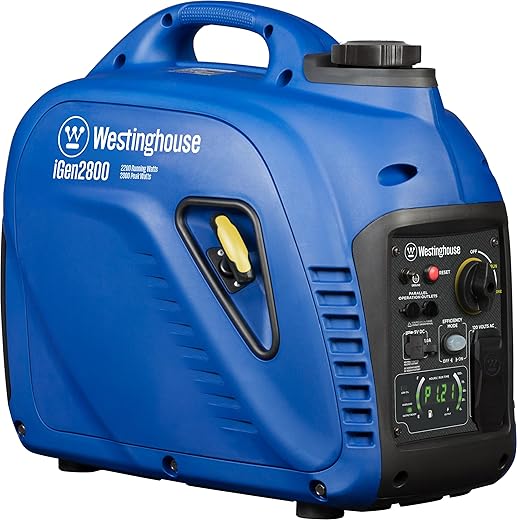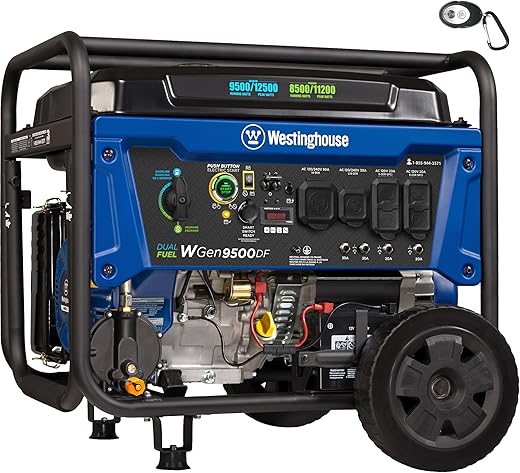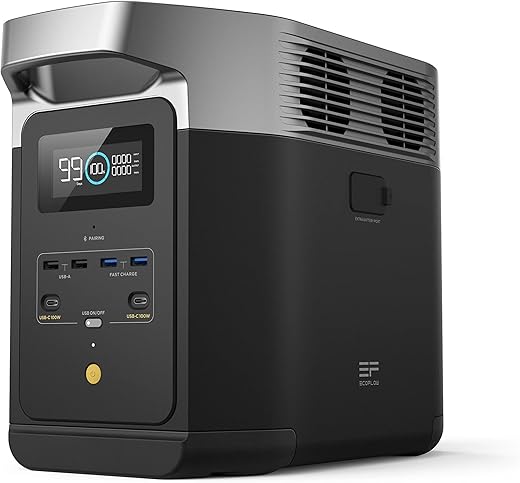In the realm of portable power solutions, the choice between the Westinghouse 2800W Inverter Generator and the Champion 4250W Inverter warrants careful consideration. Both models offer unique features and specifications tailored to different power needs, making them popular options for camping, tailgating, or emergency backup. In this comparison, I will examine their performance, efficiency, and usability to help determine which generator might best suit various requirements.
**Quiet Camping
The Westinghouse 2800 Peak Watt Portable Inverter Generator offers a lightweight and quiet solution for emergency power needs, delivering 2200 rated watts with just 52 dBA noise output and up to 12 hours of run time. Its dual USB outlets and capability for parallel operation make it a versatile choice for running essential home equipment efficiently.
RV Adventures
The Champion Power Equipment 4250-Watt Dual Fuel RV Ready Portable Open Frame Inverter Generator features advanced digital hybrid technology for quieter and lighter operation, along with the versatility to run on gasoline or propane. With 4250 starting watts and 3500 running watts, it offers up to 22 hours of run time, making it an ideal choice for RVs, tailgating, and home backup needs.
Westinghouse 2800W Inverter Generator
Power Output
2800 Peak Watts, 2200 Rated Watts
Weight
46.3 lbs
Noise Level
As low as 52 dBA
Fuel Type
Gas Powered
Run Time
Up to 12 hours on a 0.98-gallon tank
Champion 4250W Inverter
Power Output
4250 Starting Watts, 3500 Running Watts
Weight
20% lighter than traditional Champion 3500-watt generator (exact weight not specified)
Noise Level
64 dBA
Fuel Type
Dual Fuel (Gasoline or Propane)
Run Time
Up to 22 hours on gasoline
Westinghouse 2800W Inverter Generator
Champion 4250W Inverter
Westinghouse 2800W Inverter Generator
Champion 4250W Inverter
Comparison chart


Comparison Table
Unique Selling Points (USPs)
Westinghouse 2800 Peak Watt Inverter Generator
- Lightweight Design: Easy to transport for outdoor activities.
- Extended Run Time: Ideal for long camping trips or power outages.
- Super Quiet Operation: Perfect for use in residential areas or while camping.
Champion 4250-Watt Dual Fuel Inverter Generator
- Dual Fuel Capability: Flexibility to use either propane or gasoline.
- Higher Peak and Rated Wattage: More power available for larger devices including RVs.
- RV Ready: Comes with a 120V 30A RV outlet, making it suitable for powering recreational vehicles.
Similarities
- Parallel Capability: Both models can be connected with another unit to increase power output.
- Electric and Manual Start: Offers ease of operation regardless of user preference.
- 3-Year Warranty: Provides peace of mind for consumers.
Pros & Cons
Westinghouse 2800 Peak Watt Inverter Generator
Pros:
- Extremely lightweight for portability.
- Very quiet operation, making it suitable for camping.
- Long run time on a smaller fuel tank.
Cons:
- Lower overall wattage compared to Champion generator.
- Not RV ready, limiting its versatility for RV owners.
Champion 4250-Watt Dual Fuel Inverter Generator
Pros:
- Higher wattage, suitable for larger appliances and RVs.
- Dual fuel capability increases versatility.
- Quiet operation even at higher loads.
Cons:
- Heavier and less portable than the Westinghouse model.
- Slightly shorter run time on gasoline compared to Westinghouse.
Conclusive Assessment
While both generators have unique advantages, the choice ultimately depends on specific needs:
- Champion Generator: A conditional winner for users who require more power and the flexibility of dual fuel, especially for RV use. Ideal for tailgating, camping, or emergency home backup.
- Westinghouse Generator: A better fit for those prioritizing lightweight design and exceptional noise reduction, suitable for casual outdoor activities or short-term power needs.
Final Summary
In conclusion, if you need a powerful, flexible generator with dual fuel options for camping or RVing, the Champion 4250-Watt Inverter Generator is your best bet. Conversely, if portability and quiet operation are your main priorities, the Westinghouse 2800 Peak Watt Generator would serve you well. Each model excels in its manner, addressing different user requirements effectively.
Exploring Top Alternative Inverter Generators
Guidelines for Comparing Inverter Generators
When evaluating inverter generators, especially models like the Westinghouse 2800W Inverter Generator and Champion 4250W Inverter, it’s essential to consider various critical factors to ensure you choose the best product for your needs. This guide provides a structured approach to comparing different models, featuring key considerations and defining details.
Key Factors to Consider
Power Output
- Wattage Ratings:
- Look at both starting (surge) wattage and running wattage.
- Higher wattage outputs provide the capability to run more devices simultaneously.
- Purpose of Use:
- Consider what you intend to power (e.g., RVs, power tools, home backup) and select a generator that meets those needs.
Fuel Efficiency
- Runtime:
- Check how long the generator can run on a single tank of fuel at various loads.
- Fuel Type:
- Determine if it uses gasoline, propane, or dual-fuel and evaluate the associated costs and availability.
Portability
- Weight and Size:
- Assess the overall dimensions and weight of the generator for ease of transport.
- Design Features:
- Many generators come with wheels and handles, which enhance mobility.
Noise Levels
- Decibel Rating:
- Inverter generators are typically quieter than conventional generators. Look for models with lower decibel ratings for less noise pollution.
- Noise Reduction Technology:
- Some units incorporate advanced technology to reduce sound levels further.
Build Quality and Durability
- Material:
- Investigate the materials used in construction (e.g., steel vs. plastic).
- Weather Resistance:
- Consider features that enhance durability, like weatherproofing and corrosion resistance.
Additional Features
- Control Panel:
- Ensure the control panel is user-friendly with easy access to outlets and indicators.
- Ports Available:
- Look for a variety of outlets, including USB ports, 120V AC outlets, and DC outlets.
- Parallel Capability:
- Some models can connect with another generator for increased wattage.
Brand Reputation and Warranty
- Brand History:
- Research the manufacturer’s history and customer reviews for reliability.
- Warranty:
- Consider the warranty period and what it covers as this can affect long-term satisfaction and reliability.
Critical Details and Benefits
- Efficiency:
- Inverter generators are typically more fuel-efficient than conventional generators, leading to cost savings over time.
- Clean Power:
- They provide cleaner energy output, making them suitable for sensitive electronics.
- Ease of Use:
- Many models come with simple start mechanisms, typically electric start, making operation more straightforward.
- Eco-Friendly Options:
- Some generators feature eco-mode to adjust power outputs, further reducing fuel consumption and emissions.
Essential Questions About Inverter Generators
When comparing the Westinghouse 2800 Peak Watt Portable Inverter Generator and the Champion 4250-Watt Dual Fuel Inverter Generator, there are several key differences to consider:
- Power Output: The Westinghouse model provides 2800 peak watts and 2300 running watts, making it suitable for smaller devices and applications. In contrast, the Champion generator has a higher output capacity with 4250 peak watts and 3500 running watts, allowing it to power larger appliances and more devices simultaneously.
- Fuel Type: The Champion generator is versatile as it operates on both gasoline and propane, providing flexibility in fuel choices. The Westinghouse model, however, is a gas-only generator, which might limit fuel options for some users.
- Design and Weight: The Westinghouse generator is designed to be lightweight and portable, which is beneficial for users looking for easy transport. The Champion generator has an open frame design that is typically more robust and might offer better stability, but it is generally bulkier and may weigh more.
- Run Time: The runtime can vary between models depending on load and fuel type. The Westinghouse generator offers a long run time, although specific hours can depend on usage. The Champion model also boasts a significant runtime, particularly when using propane, making it effective for longer outings or power outages.
- Noise Levels: Both generators incorporate quiet technology features; however, the Westinghouse generator is marketed as super quiet, which could be an essential consideration for users in noise-sensitive environments.
- Parallel Capability: The Westinghouse inverter generator supports parallel operation, enabling it to connect with a second unit to double the power output. In contrast, while Champion models also commonly support parallel capability, always verify specific compatibility for the 4250-Watt model.
- Application Use: Given its higher power output and dual fuel capability, the Champion generator is typically better suited for RVs and larger appliances, while the Westinghouse generator caters more to light recreational usage, camping, or backup for small devices.
By taking these factors into account, prospective buyers can choose the generator that best meets their specific power needs and operational preferences.









I ended up going with Champion last year and it’s been a lifesaver during power outages!
Wow, this comparison is super helpful! I’ve been on the fence about which generator to buy.
Can’t beat Westinghouse’s warranty! That’s a huge plus for me.
Thanks for breaking this down! I’ll definitely be bookmarking this for my next purchase.
Does anyone know if the Westinghouse model is quieter than the Champion? Noise is a big deal for me.
I’ve heard great things about the Champion but never tried Westinghouse. Anyone have first-hand experience?
Love how detailed the pros and cons are! Makes choosing so much easier 🤔.